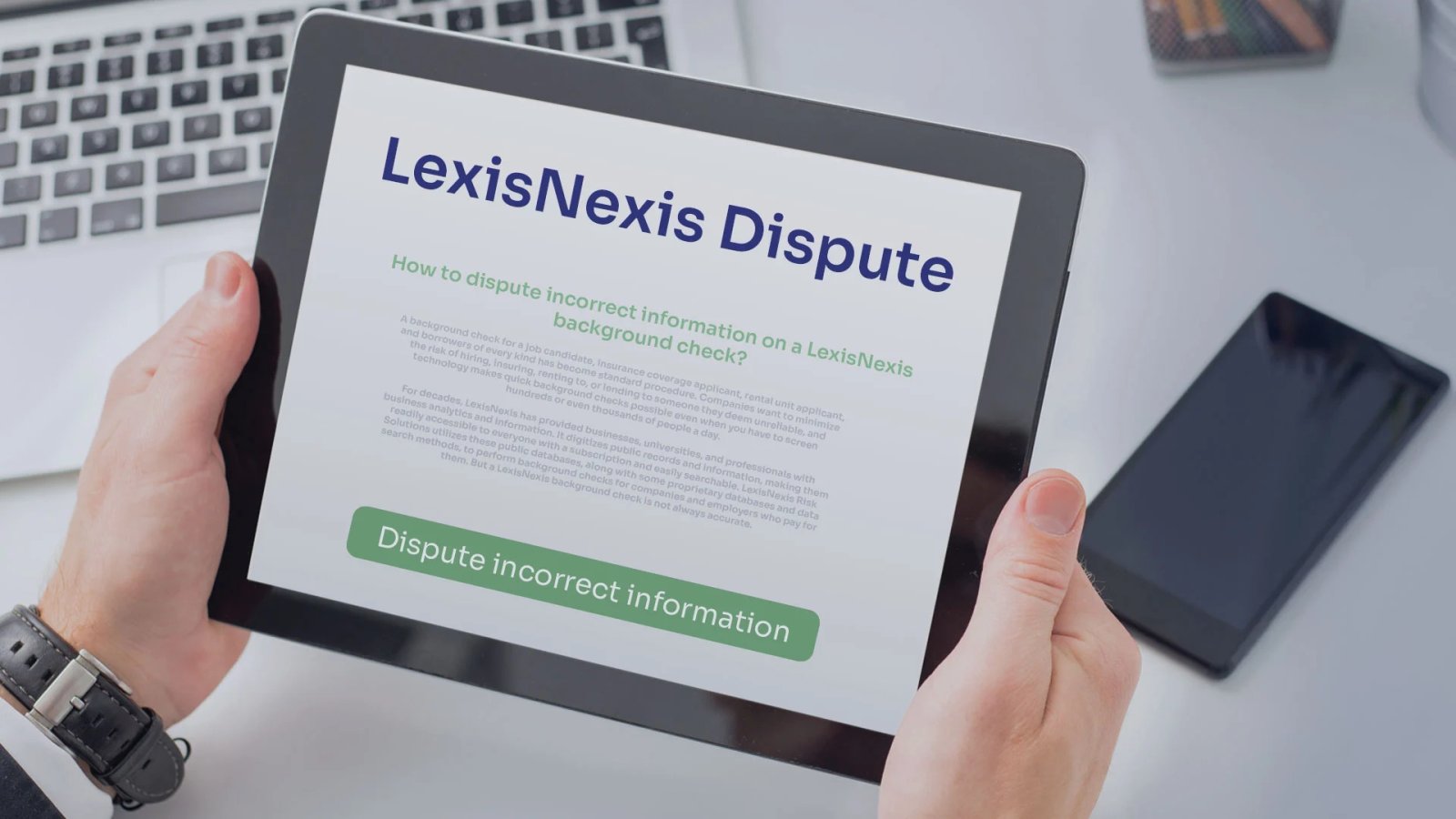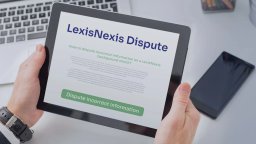The Hidden Power of LexisNexis - and the Lives It Quietly Derails
- Blog
- Insurance Background Check Errors
The Hidden Power of LexisNexis - and the Lives It Quietly Derails

When LexisNexis Gets It Wrong: Hidden Influence, Real Consequences
Most Americans have never heard of LexisNexis Risk Solutions. Fewer still realize that this data broker may be silently undermining their access to jobs, housing, and insurance. Yet every day, LexisNexis compiles and distributes detailed reports that help shape the outcomes of credit, employment, and insurance decisions. When the information is wrong - as it too often is - the consequences can be devastating.
In recent years, LexisNexis has become the subject of mounting legal scrutiny. The company’s practices have been challenged in courtrooms across the country, and the allegations are consistent: LexisNexis fails to ensure the accuracy of its reports. The results include mistaken criminal histories, inflated insurance claims, and flawed risk assessments - each one capable of altering the course of a person’s life.
Where and When LexisNexis Products Are Used
LexisNexis Risk Solutions plays a behind-the-scenes role in many major life decisions - often without consumers realizing it. Their data products are used by companies and institutions to assess risk, verify identity, and determine eligibility for various services. Whether you're applying for a job, buying a car, renting an apartment, or insuring your home, there's a good chance LexisNexis is involved in the background.
Common Situations Where LexisNexis Reports Are Used:
- Employment background checks – Employers may use LexisNexis to review criminal, financial, and personal history.
- Tenant screening – Landlords and property managers rely on LexisNexis data to assess rental applicants.
- Auto and property insurance underwriting – Insurers use C.L.U.E. reports to decide coverage eligibility and set premium rates.
- Loan and mortgage applications – Banks may review LexisNexis reports for identity verification and fraud prevention.
- Identity verification for government benefits or legal compliance – Agencies and institutions may use LexisNexis to comply with regulations or prevent fraud.
- Debt collection and skip tracing – Collectors use LexisNexis to locate individuals and gather financial information.
- Legal investigations and litigation support – Law firms and agencies access LexisNexis data for due diligence and case research.
LexisNexis lawsuit examples:
One of the most significant legal rebukes came in Smith v. LexisNexis Screening Solutions, where the jury found that LexisNexis negligently included another individual’s criminal record in the plaintiff’s report. The verdict - $75,000 in compensatory damages and $300,000 in punitive damages - was a warning shot to the industry. The message was unmistakable: data brokers cannot operate without accountability.
Another LexisNexis lawsuit, Contreras v. LexisNexis Risk Solutions, Inc., underscored the systemic nature of the problem. This class action alleged that LexisNexis failed to adopt adequate procedures to verify the accuracy of its consumer data. Because its reports are distributed widely across the insurance industry, a single error can ripple through multiple companies. This can result in auto insurance rates increasing unexpectedly for consumers - often without their knowledge or understanding of why. Many only learn of the issue when attempting to dispute an insurance claim or after being denied coverage.
C.L.U.E. driving record dispute:
At the heart of much of this controversy is a little-known product: the Comprehensive Loss Underwriting Exchange, or C.L.U.E. This database, managed by LexisNexis, contains up to seven years of auto and property insurance claims and is used by insurers to evaluate risk. A single mistake in a C.L.U.E. driving record report - such as a claim that never happened or one tied to the wrong individual - can result in sharply higher premiums or outright denials of coverage.
For many, the first step toward answers involves requesting and reviewing their LexisNexis CLUE report. Under the Fair Credit Reporting Act (FCRA), consumers are entitled to one free copy of their report every 12 months and have the right to initiate a LexisNexis C.L.U.E. report dispute if they find inaccuracies. LexisNexis is then obligated to investigate and correct verified errors within 30 days. Unfortunately, many consumers report difficulties even getting through to the company, making a LexisNexis report dispute a frustrating experience.
You have the legal right to dispute insurance claim entries that are false or outdated on your report.
Legal assistance has become essential. Consumer Attorneys specialize in holding data brokers accountable. We guide clients through the dispute process, help gather documentation, and, if necessary, file lawsuits. For victims of LexisNexis report errors, especially those wrongly flagged or denied due to incorrect information, this legal recourse may be the only path forward.
The stakes for consumers are immense. Emotional distress, job loss, denial of housing, and financial hardship are common. And while some corrections are eventually made, many report the same issues resurfacing later, often when least expected. These legal claims often involve not just compensatory damages but punitive ones as well - sending a message that negligence in consumer data handling will not go unpunished.
This isn't merely a technical issue - it's a deep-seated problem in a largely unregulated industry. Data brokers like LexisNexis wield immense power with minimal oversight. They operate largely out of sight, leaving consumers responsible for discovering and fixing mistakes they didn’t cause.
How to dispute LexisNexis report:
Once you receive the report, review it carefully. If you spot any errors - such as claims that don’t belong to you - you have the right to file a LexisNexis C.L.U.E. driving record dispute and request corrections. But call us first - we can help you avoid mistakes, preserve your rights, and build a stronger case from the start.
The path forward is clear: consumers must exercise their rights, request their reports, dispute insurance claim records, and file a LexisNexis report dispute when necessary. And if LexisNexis doesn’t respond appropriately, they should not hesitate to seek legal support. Consumer Attorneys can help, and thanks to the FCRA, legal action is accessible and costs nothing out of pocket.
If you believe LexisNexis has made a mistake in your background check or insurance record, remember this: you have rights. You have recourse. And you don’t have to fight alone.
When is it necessary to file a lawsuit against LexisNexis?
If you’ve filed a LexisNexis dispute or a C.L.U.E. report dispute and LexisNexis fails to correct verified errors, continues to report inaccurate information, or if the errors result in serious harm - like job loss, loan denials, or increased insurance costs - litigation may be the only option to compel action and seek compensation.
How do I get my LexisNexis auto insurance report?
If you’re concerned about high auto insurance premiums or suspect an error in your records, it’s smart to request a copy of your LexisNexis auto insurance report - commonly known as the C.L.U.E. (Comprehensive Loss Underwriting Exchange) Auto Report. This report shows up to seven years of insurance claims related to your vehicle.
Here’s how to request it:
- Visit the LexisNexis Consumer Portal
To file a LexisNexis dispute online - Go to consumer.risk.lexisnexis.com and click on "Request a Report." Alternatively, LexisNexis dispute phone number is 1-800-456-6004 - Select the C.L.U.E. Auto Report
Choose the “C.L.U.E. Auto” option when prompted to pick the type of report you want. - Verify Your Identity
You’ll need to provide personal information such as your full name, address, date of birth, and Social Security number. This is required to verify your identity. - Submit Your Request
You can submit the request online, by mail, or by phone. You’re entitled to one free report every 12 months under the Fair Credit Reporting Act (FCRA), or any time you’ve been denied insurance due to information in the report.
Frequently Asked Questions
In many cases, consumers are unaware that inaccuracies in their LexisNexis records - particularly their C.L.U.E. reports - are the culprit. These reports track auto and property insurance claims and can include false or outdated information. Whether due to clerical errors, mixed files, or data tied to the wrong individual, these inaccuracies can trigger higher premiums or denial of coverage. To protect themselves, consumers should request and review their LexisNexis C.L.U.E. reports annually and pursue a LexisNexis C.L.U.E. report dispute if necessary.
Not necessarily. While the Fair Credit Reporting Act gives you the right to dispute inaccurate information with LexisNexis or any credit reporting agency, it's not your only option. If the mistake is serious - like a wrongful criminal record or denial of housing or insurance - and you already have proof it’s wrong, you may be able to take legal action right away. In many cases, the harm caused is too severe or time-sensitive to wait for a drawn-out dispute process. That’s why speaking with an experienced attorney can help you decide the best course of action based on your unique situation.
Be prepared to gather documentation, including copies of the disputed reports, evidence of harm, and any correspondence. Legal assistance is essential - Consumer Attorneys handle such cases regularly and can guide you through the process without any out-of-pocket costs.


Daniel Cohen is the Founder of Consumer Attorneys. Daniel manages the firm’s branding, marketing, client intake and business development efforts. Since 2017, he is a member of the National Association of Consumer Advocates and the National Consumer Law Center. Mr. Cohen is a nationally-recognized practitioner of consumer protection law. He has a we... Read more
Related Articles



R
ONGS™You pay nothing. The law makes them pay.





